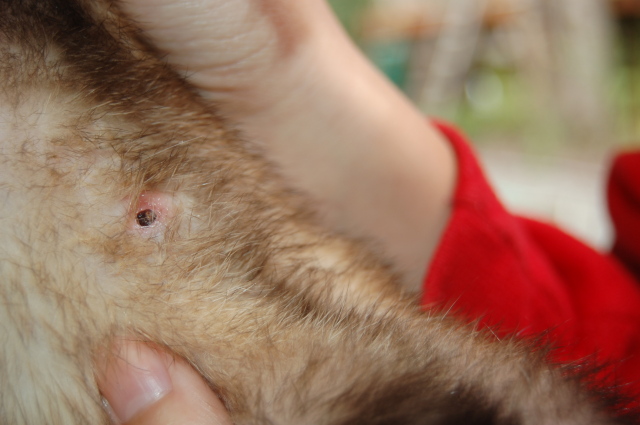QuestionHi Cynthia Ann~
Thank you for offering your time and expertise on ferrets. I have a male ferret, Pooh, about 7 years old. I've had for 5 years and he wandered into our garage, so I guestimate the age. He had left adrenal gland and spleen removed 2 years ago, and recently was diagnosed with a paraprostatic cyst and enlarged right adrenal gland. He has been on Orbax (antibiotic) a few times for UTI's and straining to urinate. The vet gave him a "mega dose" of lupron May 4th and asked me to come back for another shot in 2 weeks. Pooh was starting to look better, his hair was growing back and he even started playing a bit (it's been a few months since I've seen that). I took him back for another Lupron injection almost 3 weeks after the 1st "mega dose" (May 23). The last week his hair is falling out worse than ever, he has dark spots forming more every day all over his back, and his hind legs are slipping so that he keeps falling over when he walks. It's almost as if he was doing better and the 2nd Lupron injection has accelerated his disease. Sorry for the long description, but have you ever heard of Lupron having a reverse effect? Thank you for your time.
AnswerHello Melody,
Poor Pooh! I am so sorry to hear... Adrenal is a horibble disease that affects thousands of ferrets.
The left adrenal gland is the one most commonly affected (80-90% of the cases). Why was his spleen removed along with the gland? It is not typical to remove the spleen during an adrenal gland procedure unless there is a tumor or other problem with the organ. It functions separately from the adrenal system, and I am wondering if he could have another underlying problem still going on.
In some cases, removing the affected gland solves the problem. At other times, the remaining gland can also become diseased and the problem will continue. If this is to happen, it generally occurs between one and two years. Ferrets are one of the few animals able to survive without both of their adrenal glands since there is usually enough residual tissue. However, complications can arise, which is why both are not normally removed unless bilateral disease is suspected.
Lupron is an alternative to surgery, and roughly 80% of ferrets show some positive response. Lupron injections will not cure adrenal disease; it will only help slow the progression. It also helps shrink prostrate tissue, which may be why it was chosen due to the cyst. Lupron, however, will NOT work on malignant tumors (roughly 45% of cases), but is effective on hyperplasia and adenomas. Lupron is generally well tolerated as usually has few side effects. Lupron should not make the disease worse, so I am suspecting either his tumor is malignant or he has another underlying cause along with the disease. Cancer in the right adrenal gland can spread to the liver, for example.
It would be wise to contact your vet ASAP for a re-evaluation. Rear end-weakness concerns me. Many things can cause it, and it would be impossible for me to guess a reason. Your veterinarian might want to run some blood-work or other tests to ensure there is not another problem besides adrenal disease. Lupron does not always work, but most ferrets are pretty tolerant of it and few side effects are seen. I am doubtful his symptoms are due to the second injection... but regardless, you should have him seen again ASAP.
Further information on Adrenal and Lupron:
http://www.miamiferret.org/lupron.pdf
http://www.drsfostersmith.com/pic/article.cfm?c=9547&aid=1973
http://www.ferret-universe.com/health/adrenal.asp
Good luck and please let me know if you have any other questions! I will be hoping for the best!
-Cindy P.
PS:
As a side-note, it is now thought that adrenal disease is caused by the early spaying/neutering of ferrets in the United States. All large scale breeders such as Marshall Farms fixes their ferrets BEFORE 6 weeks of age, which does not allow for the proper hormones to aid in growth and development. Adrenal disease is RARELY seen in countries such as the UK, where ferrets are fixed at a much later age. It is an EPIDEMIC in the United States, and one of the most common diseases treated in ferrets in this country.
This is why I do NOT support the large scale breeders by purchasing my pets from stores. I adopt or buy from VERY reputable breeders (who DO NOT spay or neuter before 6-7 months of age). I would like you to be aware of this. Please spread the word to NOT SUPPORT large-scale breeders such as Marshall Farms by purchasing their ferrets from pet stores.

 vomiting ferret that is otherwise happy
QuestionQUESTION: Dear Emilee,
first of all, you and yo
vomiting ferret that is otherwise happy
QuestionQUESTION: Dear Emilee,
first of all, you and yo
 Elderly ferret
Question
Booger
Hi,
I rescued an older ferret named Bo
Elderly ferret
Question
Booger
Hi,
I rescued an older ferret named Bo
 SWOLLEN FEMALE PARTS
QuestionSmokey napping
QUESTION: Hello, I have a
SWOLLEN FEMALE PARTS
QuestionSmokey napping
QUESTION: Hello, I have a
 My ferrets die
Question
Mia
My ferret die lest nite she was ten
My ferrets die
Question
Mia
My ferret die lest nite she was ten
 ferret sores
QuestionSore
QUESTION: My ferret skittles is alm
ferret sores
QuestionSore
QUESTION: My ferret skittles is alm